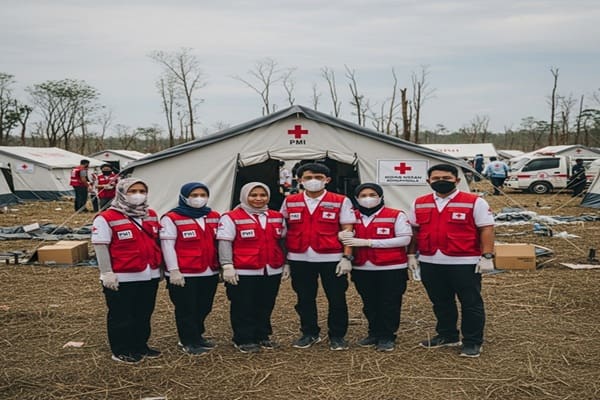
Newsletter Subscribe
Enter your email address below and subscribe to our newsletter

Enter your email address below and subscribe to our newsletter

When disaster strikes or communities are in need, there’s one group of people you can always count on in Indonesia — Korps Sukarela (KSR), or the Volunteer Corps of Palang Merah Indonesia (PMI), the Indonesian Red Cross.
These are everyday people — students, professionals, parents — who train hard, show up without hesitation, and give their time, skills, and hearts to help others. From disaster relief to public health campaigns, they’re the silent force making a massive difference.
If you’ve ever wondered what Korps Sukarela is, how to join, or why they matter so much, this guide will walk you through their history, mission, impact, and how you can get involved.
Korps Sukarela is the volunteer arm of the Indonesian Red Cross (PMI). Members are specially trained to respond to emergencies, provide first aid, run health campaigns, and support communities in need.
They are often the first to arrive when floods, earthquakes, or volcanic eruptions hit — and sometimes the last to leave, ensuring everyone is safe and supported.
KSR’s story goes back to post-independence Indonesia, a time when unity and humanitarian help were essential. PMI recognized the need for an organized team of trained volunteers.
At first, KSR units were small and local — often formed in universities and communities.
Over the decades, they grew into a nationwide network with local, regional, and institutional chapters.
Today, they’re a trusted backbone of disaster relief, public health, and community outreach.
If you’re in Indonesia and passionate about helping others, joining KSR is open to almost anyone.
Basic requirements:
Age: 18+ years old
Education: At least a junior high school graduate
Health: Good physical and mental condition
Training: Complete minimum 76 hours of basic training
Commitment: Ready to serve during disasters and social programs
Many people join through university KSR units or recruitment drives from local PMI chapters. Training covers:
First aid & evacuation procedures
Logistics & aid distribution
Psychological first aid
Specialized courses for those focusing on health or disaster mitigation
KSR volunteers do far more than just show up in emergencies. Their work spans both disaster and community services.
Indonesia’s geography makes it prone to:
Earthquakes
Tsunamis
Volcanic eruptions
Floods
KSR volunteers assist with:
Evacuations
Temporary shelters
Emergency medical care
Aid distribution
KSR often manages blood donation campaigns:
Recruiting donors
Running donation events
Educating communities about regular donations
They organize:
Free health check-ups
Vaccination campaigns (including COVID-19)
Hygiene and sanitation programs
Mental health workshops
In schools and communities, KSR runs programs on:
HIV/AIDS awareness
Drug abuse prevention
Conflict resolution
Environmental care
KSR is structured and operates under local PMI branches. Roles include:
Coordinator/Commandant (often elected)
Training officers
Logistics teams
Public relations teams
They hold regular drills, meetings, and refresher courses so everyone is ready at a moment’s notice.
University KSR units, known as UKM KSR PMI, are some of the most active. Students:
Respond to emergencies
Lead awareness campaigns
Build leadership skills
These units are often the training ground for future doctors, nurses, community leaders, and policy advocates.
While it’s hard to measure compassion, here are some numbers that show KSR’s influence:
Tens of thousands of active volunteers nationwide
Hundreds of disaster missions every year
Millions reached through health and social programs
Thousands of students trained annually
Volunteering isn’t always easy. KSR members often deal with:
Physical risks in dangerous environments
Emotional stress from constant exposure to crisis
Limited resources during missions
Lack of recognition despite their impact
Time management struggles balancing work, school, and service
KSR volunteers have been part of historic rescue missions.
One example: During the 2010 Mount Merapi eruption, KSR Yogyakarta played a critical role in evacuations and setting up shelters — saving countless lives.
Many members go on to:
Join international humanitarian organizations
Lead NGOs
Receive national awards for service
Not everyone can commit to being on the ground — but you can still help:
Donate to PMI’s disaster fund
Offer transport or logistics during crises
Collaborate on community projects
Share their campaigns on social media
Provide professional training or expertise
Many companies and NGOs partner with KSR for CSR programs and community outreach.
Also Read : Unlock the Full Potential of Microsoft Entra Suite for Cloud Security
In a disaster-prone country, having trained, committed volunteers isn’t just “nice to have” — it’s essential. KSR’s quick response often means the difference between chaos and organized relief.
KSR is more than an organization. It’s a family bound by shared values: compassion, resilience, and selflessness.
Joining KSR doesn’t just help others — it helps you:
Build leadership skills
Gain medical and rescue knowledge
Develop teamwork under pressure
Expand your professional network
Visit your local PMI branch or website
Check for university KSR units if you’re a student
Attend an open recruitment event
Commit to the training schedule and requirements
Korps Sukarela members aren’t paid. They aren’t forced. Often, they aren’t even recognized. Yet, they show up rain or shine, crisis or calm — ready to serve.
They are the heartbeat of Indonesia’s humanitarian efforts, and supporting them means supporting a stronger, more resilient nation.